
Hungarian tales around the end of the regime(s).

Stock Ede
Noah's Ark .

Nostradamus, a fõpap

Irma arrives at her 18th birthday in a reform school.

Pozsár Pál
Iván is living in exile from Hungary when he receives word that an old flame is ill. His return to Budapest rekindles old memories and reopens old wounds.

Uncle Szabó, The Janitor
The story setup in the late Communist era. Two school boys are best friends. One's Father is a mighty communist party secretary, the other is an anti-communist rebel.

Felsenthal
This epic story takes place between 1820 and 1860 during the Habsburg Monarchy, and portrays the life one of the greatest Hungarian aristocrats - Count Széchenyi - who was born with extra-ordinary mental and spiritual talents. In the years following the fall of Napoleon the young count Széchenyi irresponsibly seduces his brother's wife, and the consequent scandal ruins his career as an army officer. After the sudden death of his humiliated lover Count Széchenyi drastically changes his character from that of a shallow young man into a responsible nobleman seeking to conquer his fate by creating great achievements in his remaining life.


Dezső
This is a story of a man who wants to grasp and hold his beloved one by him and a woman who insists on that her love can't be grasped; 'she' only can deliver hers. It has written Comedy, Romance etc... but, this movie doesn't include anything funny, I believe. After I see the movie, I thought that love springs through a one's heart and it has its own spirit. It doesn't have to have any company. The matter is if it coincides its mate; that's it.

Csebutikin
The film is a modernised version of the Chekhov drama, put in Budapest, Hungary, in a Soviet barracks between 1987 and 1991.

Ijon Gripenriter
In 1974, mountain climber Molly Higgins (Lori Singer) begins her ascent of Lenin Peak, located in the Pamir Mountains on the edge of the Himalayas. She's part of an international climbing expedition that has brought a team of U.S. climbers into the USSR. But completing their mission won't be easy, as Mother Nature and internal divisions hamper their journey up the perilous peak, putting all their lives in jeopardy. This made-for-TV movie is based on a true story.
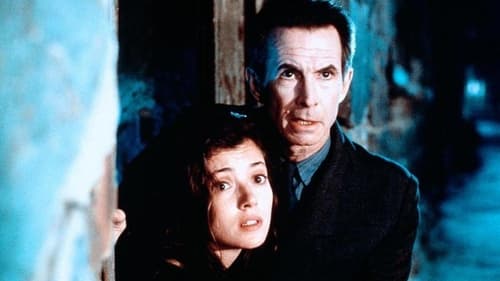
Max
An atmospheric, sub-hallucinogenic venture into the world of the unknown. The enigma facing a young woman is the identity of her father. Unfortunately for her, she becomes drawn into a small Romanian underworld of brooding menace, darkness, torture chambers, and bizarrely over make-over'ed vampires. The moody undertones and well chosen locations are certainly a bonus, as is the comically funny finale.

Defoe
Defoe, lacking fantasy of his own takes home the drunkard sailor from the pub and lets him tell his stories on the uninhabited island.
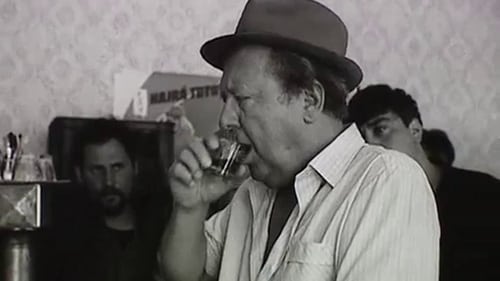
Writer
In the small village of Rátót, every male is called Béla. When a woman gives birth to her child, she names him Józsi...

Kisbíró
In the small village of Rátót, every male is called Béla. When a woman gives birth to her child, she names him Józsi...

Director
In the small village of Rátót, every male is called Béla. When a woman gives birth to her child, she names him Józsi...

Apa
The actress is always lonely, she has nobody to love. She adopts a young boy from the orphanage, who formerly arrived on Earth by a flying suitcase and a policeman took him to the orphanage. The actress would be willing to adopt him, but there is no hope for this at the beginning.

Apa

The life of Tamás, antiquities dealer, runs in a normal, everyday way, he is stealing, swindling, cheating on his wife just like everybody else. Suddenly three men, who live in the attic, start harassing him. They construct coarse and unpleasant schemes against him and carry them into effect at the most unexpected times and places.

Zenetanár
A divorced middle-aged woman takes home an ardent suitor, only to discover that he prefers her teenage son. The mother is an overworked coffee-shop attendant, the suitor turns out to be a plain-clothes policeman and the boy is a frustrated flautist.

Story of the owners (Mastroianni and Schygulla) of a fancy nightclub in Budapest before and during WWII.
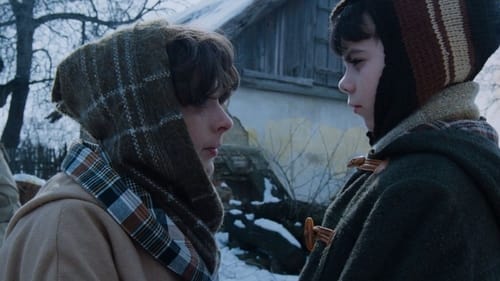
Feri, az apa
The story of 10-year-old boy and his family against the backdrop of the bloody events of 1956, in Budapest. Children do not yet understand what is going on, but they're happy because the schools are closed. But gradually, to adults and children comes the understanding that something terrible is happening. Disappearing relatives, friends, and even killed some. Tips sent an army to put down the counterrevolutionary rebellion.

Altschuler
Janos Flandera (Frigyes Funtek) is a student who is kept by an older woman in this depressing drama. When he applies to a prestigious school in Moscow, he is turned down because he is a gigolo. Not only is his scholarship request denied, he is sentenced to a year in prison at hard labor. Janos abandons the jealous older woman who helped deny his entrance to the school. Punished after defending a political prisoner, Janos takes solace in love affairs, but his union with the crippled daughter of a prominent political official puts his life in danger.

Rexa Lajos
A typist girl who is under the influence of nervous breakdown walks out to the street stark naked from the office she works in. A young physician goes by accidentally and tries to help her, spreading his coat over her nude body. From this moment his life changes completely.

Piber

(as Garas Dezsõ)
Péter tries to make a film on "Swan-Lake". At the weekend, shooting stops and the staff goes home. Péter leaves for home with his wife, Judit, but as he catches sight of a girl at the station, he cannot resist the temptation and gets off the train.

Mariann's father
In December 1956 there is a chaotic situation in Hungary. The revolution is put down by the Soviet army. People leave the country in large numbers for fear of revenge. A young soldier (György Angeli) who also took a part in the revolution, takes a train to Vienna together with his friend (Dániel Szerencsés). Written by Tamas Patrovics

Divided into two different halves separated by mood and subject matter, this is an uneven drama about the experience of one Hungarian Jew before and during the fascist takeover of Budapest. The hero Pali (Zoltan Bezeredi) arrives back in Budapest from the U.S. and meanders among the intellectual and social elite before he leaves for a brief stay in England. There he has an even briefer affair with a happy-go-lucky aspiring actress (Anna Kubik), and after a few other encounters with movie mavens, he heads back to Budapest -- quite inexplicably. The rest of the film deteriorates into a dark realm of hatred and violence.

Boldi Virág
As a last chance in his career, the young acrobat with a broken leg, Sajek Oszkár, attempts to obtain the wonderful secret from the retired old artist, Uncle Binder Lipi, a secret which was a world hit.

Avar Imre (as Garas Dezsõ)

Apa
The parents of Kabala (Lucky Charm) and Facsiga (Wooden Top) are divorced. Kabala, an adolescent girl was awarded to the father, while Facsiga, the younger brother was awarded to the mother, but they do not really belong to anyone. The two children want to live together at all costs.

Satire from the makers of hungarian classic Love (1971): director Károly Makk and writer Tibor Déry. Made for TV.

Stock Ede
"Ripacsok" is a great movie with great soundtrack, acting, cinematography, direction, etc. The world of "artists", hamming actors, good clowns and bad clowns... A unique movie in many ways. Pál Sándor is a very good hungarian director, watch his movies (especially the slightly better "Régi idõk focija") if you have the chance.

1852. Gáspár Noszlopy escapes from prison in order to capture the emperor, who is to visit Hungary, with his companions and force him to sign the Declaration of Independence. He is only able to find four fanatic men, as his one-time soldiers have already accepted the established order as unalterable, each of them having found a satisfactory way of life and unwilling to undertake a suicidal experiment.

Piszlicár

Pap Gedeon, fürdőigazgató

Svéd Feri
Winter of 1944, the last days of the war. When the roads and houses ceased to exist and the bottom of the cellars become filled with life, when fortunes were lost and countries burned up, her used coat was only important to Mama, the cloak-room servant of a local dance-school. Her son stole it to sell it for twenty pengő. He did it because Aranka Fussbaum's love cost money. There is no honour left in such a destroyed world. Yet still they start looking for that coat... (Elemér Ragályi won Best camera with this movie in Montreal, 1979, and in Budapest, 1980.)

The subject-matter of this comedy is age-old: that of the schizophrenic soul. Papa would have liked boy twins years ago, but her wife gave birth to a single child weighing six kilograms. He would like to dampen his feeling of emptiness by having the boy registered both as Péter and Pál.

A flamboyant comedy about love, work and money—revealing that the "planned" economy produced some unconventional entrepreneurial methods.

Kőnig
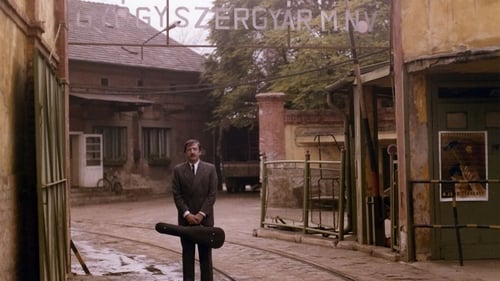
Director Sandor Simo based this film on his recollections of a period in his father's life just after World War II. In the film, Janos Torok is a chemist and an entrepreneur With enormous enthusiasm, he gets loans to purchase a small chemical plant and begins experiments to create innovative products, such as hormones. Meanwhile, the communist party has come to dominate Hungarian life in such a way that his activities are viewed as little more than criminal. He is hauled away to a prison camp, but even then his letters home are full of boundless optimism and his ideas for further experiments.
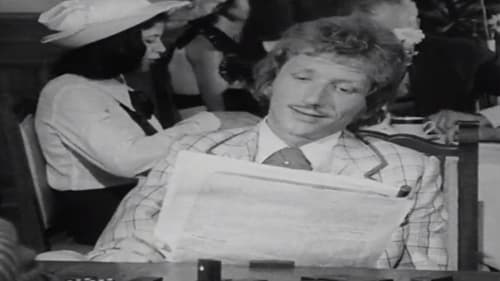
Béla, pincér (as Garas Dezsõ)

Strang felügyelõ (as Garas Dezsõ)
A ghost is haunting Lubló: Kaszparek Mihály, trader of wines, does not refrain from haunting his native town even in broad daylight. He rides his horse sitting backwards, pays with false gold and pays frequent visits to his widowed wife, who is far from being appalled by the caresses of her dead husband.

Reményi / Glück úr / Fényképész
After the breakup of the Austro-Hungarian Empire, a young Hungarian, wanted by the police for political crimes, escapes to just this side of the Austrian border. When he discovers that his escape contact has been shot, he disguises himself as a woman and, posing as a maid, takes refuge at a tuberculosis sanatorium. He lives there as a woman for the entire winter before resuming his journey in the spring.

Mezőőr
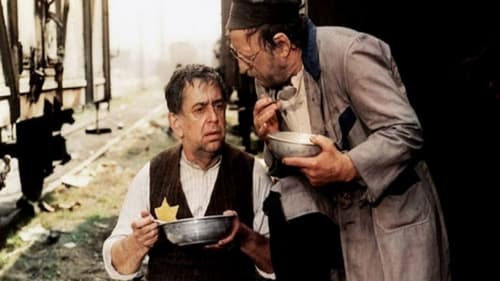
Frankfurter
A Jewish ghetto in the east of Europe, 1944. By coincidence, Jakob Heym eavesdrops on a German radio broadcast announcing the Soviet Army is making slow by steady progress towards central Europe. In order to keep his companion in misfortune, Mischa, from risking his life for a few potatoes, he tells him what he heard and announces that he is in possession of a radio - in the ghetto a crime punishable by death. It doesn't take long for word of Jakob's secret to spread - suddenly, there is new hope and something to live for - and so Jakob finds himself in the uncomforting position of having to come up with more and more stories.

This sour satire records how narrow-minded, perishable and prejudiced human relations are. Lili, an open, good-hearted, but clumsy girl gets a rusty Renault Gordini from her uncle living in France. She wants to learn driving, but makes horrible and perilous mistakes behind the wheel.

Minarik Ede, mosodás
The film is set in Budapest, 1924. Laundryman Ede Minarik's only passion is football. His dream is to see his team, Csabagyöngye, qualify for the first division. For this goal he would be willing to sacrifice everything he has. But he has nothing, even footballers just barely. The team is just like the times. But still, "we need a team!"

Georg the son

Three people skilfully kidnap the company director, who never takes the responsibility, takes sleeping pills and spends his time feeding ornamental fish. The kidnappers turn out to be no other than the Engineer, the Technician and the Worker, who only wanted to avoid bankruptcy this way.

A murder has been committed in a block of flats in Pest. Almost all the dwellers of the building behave in a suspicious way at the beginning of the investigation, although it is their everyday lapses they try to hide. In spite of the janitor's unpleasant comments, light is gradually thrown upon the case.

Mrs. Endrényi, an old woman in Old Buda learns that her house is going to be demolished and she is going to get a new apartment. Since she would like her family members to have the same advantage, she takes them in her apartment.

Archaeologist (as Garas Dezsõ)
This light comedy with grotesque elements tells the story of M, the young and beautiful model mother, who seeks happiness and a father for her precocious, but inventive daughter, Tündike.

Gedei
The protagonist of this farce is the enthusiastic, bald, spectacled Krebsz, an employee at the Prime and Sample Institute. He alerts the whole village to organise a beauty contest in the weed-field of Balatonszutykos. Hoping to win the grand prize, the leading role in a two-hour colour-film, the girls make all efforts and use all their tricks.

Józsi (as Garas Dezsõ)
The grotesque comedy with crime elements takes place in a grocery store.

Mocorgó

Small town girl Eszter adores her husband, Zoltán. He doesn't know Zoltán is having an affair with Alizka, until the woman moves in to their apartment.

Piroska néni (as Garas Dezsõ)
The protagonists of a comic Romeo and Juliet story full of gags are two widowed pensioners. Nádor and Mrs. Komáromi meet in the cemetery while mourning their dead spouses and they fall in love.

Goddard

The pseudo crime story honours the bohemian world at the beginning of the century.

Gyulus
Eve, the old professor zsongják beautiful wife surrounded by colleagues. When the professor's going away for a conference abroad, intensifying the suitors attempts. Eve, however faithful to her husband, so that the denials are increasing. Oddly enough, the rejected accidents ...

Kántor
13 March 1965 (Hungary)

Zalai (as Garas Dezsõ)
"Are you looking to buy a car? Not sure which one to buy? Clueless? We can solve all your problems. Watch our latest film! All your problems will be solved because we'll talk you out of them for the price of a single ticket." - says the comedy's obliging narrator (Ervin Kibédi), who tries to talk the viewer out of buying a car. To do this, he tells the audience some instructive and humorous car-related stories...

The turnings of this satirical story are accentuated by the comments of the Director and the Author. Éva is in love with Zoli. She expects to live a wild and modern life by his side, not the boredom of a petite-bourgeois household. On a drunken morning, Zoli writes a poem. The poem is published in a morning paper and divides readers. Because of the poem the young man is dismissed it from his work, and his landlord kicks him out from the apartment.

Szélhámos

Kormos József
Captain Kovács investigates the case of a taxi driver who was knocked down and later he disappeared without leaving a trace. Responding the call of the police six women present themselves: they all confess to be the fiancée of the driver.

Sovány
Félix, a somewhat clod-hopping young man, finds himself in the Grand Hotel of Little Lagonda, barefooted and in pyjamas. He is soon followed by a hooded, fat and leggy gangster. This is all the more strange as the hotel is under quarantine with the pretext of a plague-epidemic, in order to make it a suitable ground for the negotiations of certain oil-companies.

Neighbor
Andris is almost an adolescent boy. He would need the trust and encouragement of his family. But his father is too much preoccupied with his moral problems in his job. He has the choice either to make a fuss about the corruption discovered at the company or he tries to cover it up skilfully.

Hadnagy
A young woman on board of a bus notices that her watch has been stolen. The ticket collector keeps everybody on board, and upon the advice of a traffic police, they drive directly to the nearest police station.

Gál
On the crowded train, the workers entertain each other by telling stories.
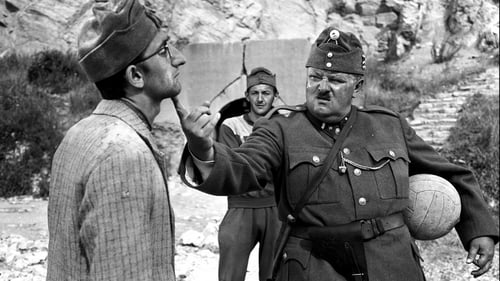
Steiner
To celebrate Hitler's birthday, a soccer match is organized between the Germans and prisoners of war.

A comedy about the dwellers of a newly handed-over building. The sullen doctor Birkás is concerned that his wife also has a job so there is nobody to keep the apartment tidy. What is more, it happens that the doctor must cook the dumplings stuffed with plums himself. The lady hairdresser, Albert, is rather jealous of his wife. His jealousy is not entirely ungrounded, and Mancika runs away with a motorcyclist. The Korbusz family live a little crowded, because in addition to Öcsi, even an energetic grandmother lives with them. But the peacefully troublesome time spent together does not disturb the family's happiness.

If there has ever been pure and undestroyable love, this is it. That is how Imre and Vera feel. The talented chemist loses his best friend for the girl's sake, then gives up his profession, only to be able to stay in the capital with Vera. But the young actress at the beginning of her career is neglected. Imre accepts an uninteresting, but well-paying position. They seem to be happy together.

Jenõ
Kölyök, this lovely, ham-handed young woman, has caused many a trouble already in the Dunaújváros Iron Works. Fortunately, however, the manager does not want to give her up, what is more, Kölyök found a second father even at the police.

Kocsmáros (as Garas Dezsõ)
In the thirties, the poor living by the Romanian-Hungarian border, were forced to smuggling if they wanted to survive. Mihály, the Hungarian peasant, kills a border guard while fleeing. He is fed up with smuggling and wants to put an end to it, yet he needs money to get a job so he embarks on another turn.

1932, Budapest. Gere János, an unemployed worker searching for employment in the capital, is organised into the secret police after a raid. Summary justice is declared, and the police wants to find an illegal communist press at any price. Gere, wandering about in the dark city, joins a man, helping him to carry his luggage. Slowly, Gere learns that his companion is a Communist and his task is to keep the press machine hidden from the police.

Panni, coming from a landless family of ten and Miska have loved each other for a long time. The pretty Panni, however, has another suitor as well: Komáromi, the big farmer. The two men fight from time to time, but then, during the time Miska is serving his military duty, Panni marries Komáromi to end the tremendous squalor of her family.

Agent
In Gerolstein, those girls who were born the same year as the princess, cannot marry until she remains maiden. An attractive and very rich husband is needed for Antónia in order to fill the treasures up. The wonderful reigning princess meets her selected bridegroom, the emperor of the neighbouring Pecunia in disguise and by accident.

Nézõ
Cabinet crisis threatens in Futbólia, due to a series of lost matches. The head of state charges admiral Duca with the task, as a last chance, to get hold of the football star of the Hungarian team presently playing in Switzerland.

University student
The twenty-year-old Gida, having just survived his first amorous disappointment, falls for Katinka, the young widow, at first sight.

A Lokomotív kapusa
The flat of Doctor Bartha is wetting, the Communal Management Enterprise does not act, the doctor and his wife are at the edge of divorce. Géza would marry his colleague, Kató, but mum is sick, the apartment is small, no money. Uncle Károly is fed up with unsuitable, charlatan business managers. Vali would marry, in order not to live on Titi and Piri any more, but the selected man wants to have a woman with her own apartment. All of them have a chance by the lottery, especially by hitting twelve scores.

Ifjú Schnaps
Liliomfi is a 1954 Hungarian comedy film directed by Károly Makk. It was entered into the 1955 Cannes Film Festival. Set in the "Golden Era" of the wandering Hungarian theatre troupes. Mariska and Liliomfi fall in love without suspecting that Mariska's foster father, Professor Szilvay, is also Liliomfi's uncle. Soon the couple must contend with the professor's plan to make Liliomfi give up his "unrespectable" profession of acting by exposing the professor's hypocrisy, greed, and tyrannical selfishness.

Csepi

Frici

















